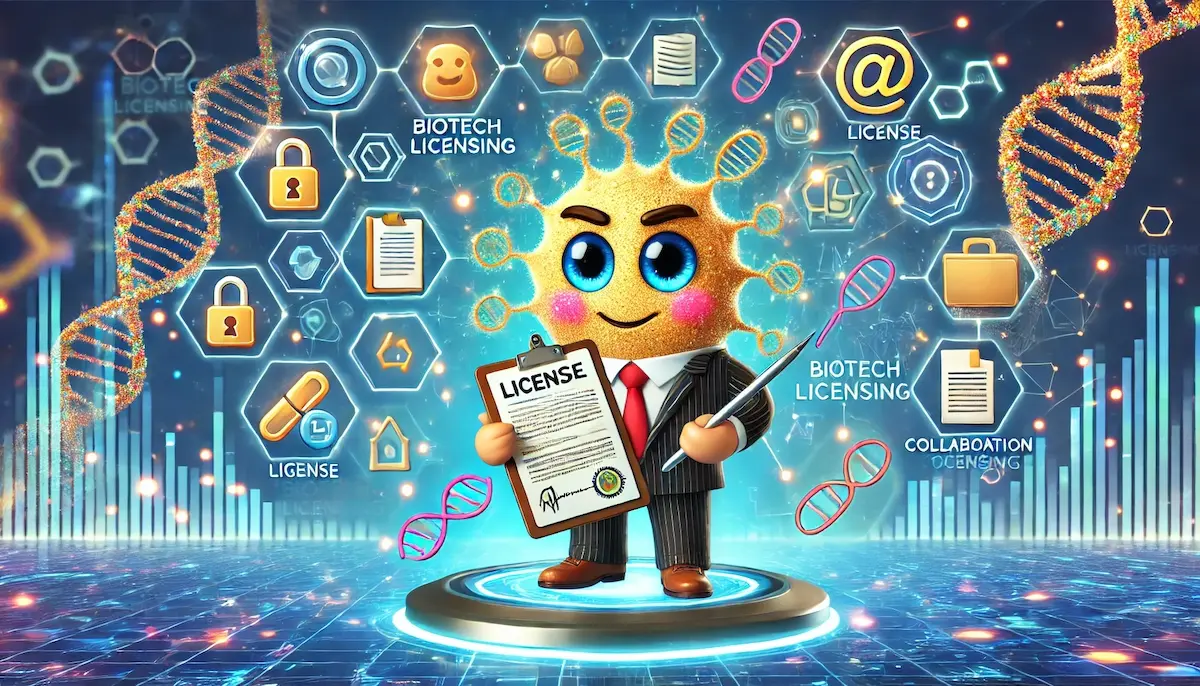Biotech licensing is a critical process in the biotechnology industry where companies, research institutions, or individuals grant permission to another party to use their intellectual property (IP), such as patents, technologies, or know-how, in exchange for financial compensation. Licensing allows innovators to monetize their inventions, while licensees gain access to cutting-edge technologies without the need for in-house development.
What is Biotech Licensing?
Biotech licensing involves the transfer of rights to use certain technologies, discoveries, or intellectual property from the owner (licensor) to another party (licensee) under agreed-upon terms. This process is essential in the biotechnology field, where the development of new products, such as drugs, diagnostics, or therapies, can be time-consuming, costly, and complex.
Licensing agreements in biotechnology can cover a wide range of IP, including patents, trade secrets, and proprietary processes. These agreements are often used to commercialize research discoveries, expand market reach, and accelerate product development.
Types of Biotech Licensing Agreements
There are several types of licensing agreements commonly used in the biotech industry:
- Exclusive Licensing: Grants the licensee exclusive rights to use the licensed IP, often within a specific field or territory. The licensor agrees not to grant the same rights to any other party within the defined scope.
- Non-Exclusive Licensing: Allows the licensor to grant the same rights to multiple licensees, enabling broader use of the IP across different entities.
- Co-Exclusive Licensing: Permits the licensor to grant exclusive rights to more than one licensee, but limits the total number of licensees.
- Sublicensing: Allows the licensee to grant some or all of the licensed rights to third parties, often with the licensor’s approval.
- Cross-Licensing: Involves two or more parties exchanging licenses to use each other’s IP, often used when both parties hold valuable IP that complements each other’s work.
Key Components of a Biotech Licensing Agreement
A biotech licensing agreement typically includes several key components:
- Scope of License: Defines the specific IP being licensed, the rights granted (e.g., manufacturing, selling, sublicensing), and any limitations on use (e.g., geographical restrictions, field of use).
- Financial Terms: Details the compensation structure, including upfront payments, royalties, milestone payments, and any profit-sharing arrangements.
- Intellectual Property Rights: Specifies how IP rights will be managed, including ownership of improvements or derivative works.
- Duration and Termination: Sets the duration of the license and the conditions under which it can be terminated by either party.
- Confidentiality: Includes provisions to protect sensitive information shared between the parties during the agreement.
- Indemnification and Liability: Outlines the responsibilities of each party in case of legal claims or damages arising from the use of the licensed IP.
- Dispute Resolution: Establishes the mechanisms for resolving disputes, such as arbitration or mediation, to avoid lengthy litigation.
Benefits of Biotech Licensing
Biotech licensing offers numerous benefits for both licensors and licensees:
- Monetization of IP: Licensors can generate revenue from their IP without directly engaging in commercialization or manufacturing.
- Accelerated Development: Licensees can expedite the development and commercialization of products by accessing proven technologies and avoiding the costs and risks associated with in-house R&D.
- Access to Expertise: Licensing allows companies to leverage the expertise and capabilities of other organizations, fostering innovation and collaboration.
- Market Expansion: Licensing agreements can enable companies to enter new markets or expand their product offerings by acquiring the rights to complementary technologies.
- Risk Sharing: Licensing can help distribute the risks associated with product development, particularly in high-risk areas like drug development.
Challenges in Biotech Licensing
While biotech licensing offers significant advantages, it also presents challenges:
- Valuation of IP: Accurately assessing the value of the IP being licensed can be difficult, leading to potential disputes over compensation and terms.
- Complex Negotiations: Licensing agreements often involve complex legal and financial negotiations, requiring careful consideration of both parties’ interests.
- Regulatory Compliance: Ensuring that the licensed products or technologies comply with regulatory requirements can be challenging, particularly in highly regulated industries like biotechnology and pharmaceuticals.
- Management of Relationships: Maintaining a positive and productive relationship between licensors and licensees is crucial for the success of the agreement, requiring ongoing communication and collaboration.
The Future of Biotech Licensing
As the biotechnology industry continues to evolve, the landscape of biotech licensing is expected to change with several key trends:
- Increasing Globalization: As biotech companies expand their operations globally, cross-border licensing agreements will become more common, requiring careful navigation of international regulations and market dynamics.
- Emphasis on Precision Medicine: Licensing agreements focused on personalized medicine, including genetic therapies and targeted diagnostics, are likely to grow as the demand for tailored healthcare solutions increases.
- Collaborative Innovation: Partnerships that combine licensing with co-development and joint ventures will become more prevalent, fostering deeper collaboration and shared innovation.
- Digital Health Integration: Licensing of digital health technologies, including AI-driven diagnostics and telemedicine platforms, will become increasingly important as the healthcare industry embraces digital transformation.
- Sustainability and Green Biotech: Licensing agreements focused on environmentally sustainable biotech solutions, such as renewable energy technologies and sustainable agriculture, will gain prominence as global attention to climate change grows.
Conclusion
Biotech licensing is a powerful tool for advancing innovation, commercializing new technologies, and driving growth in the biotechnology industry. By facilitating the transfer of intellectual property, licensing agreements enable companies to leverage each other’s strengths, accelerate development, and bring new products to market more efficiently. Blockfine thanks you for reading and hopes you found this article helpful.
